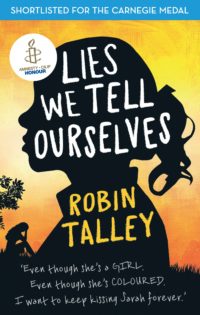Maybe if I keep trying, I really won’t feel anything
 Lies We Tell Ourselves
Lies We Tell Ourselves
by Robin Talley
When this book was chosen by my book group I was worried it would be a tough read due to the subject matter. But it turned out, the problem I had was with the narrators’ tone and voice.
That’s not to say the subject matter isn’t tough, but I was reading this at the same time as dipping in and out of Invisible Man by Ralph Ellison, and by comparison, well, it shows that Talley’s book is intended for a young adult audience.
It’s 1959 and some school districts in Virginia are holding out against integration. Sarah is one of 10 black pupils who were specially chosen to attend the white-only Jefferson High School after years of court battles. No-one at Jefferson wants them there and more than that, they don’t understand why the black students would want to come to their school.
“I wipe the tears away and stare at my reflection until my face smooths out and my eyes go empty.
This is how they have to see me. If they know I feel things, they’ll only try to make me feel worse.
Maybe if I keep trying, I really won’t feel anything.”
Linda is one of the most popular girls at Jefferson High and daughter of the town’s newspaper editor, a highly respected man who vocally opposes integration. She isn’t a violent person herself, but her objection to the violence meted out every day in the school corridors and classrooms is that it’s uncouth and interrupts her education, for which she blames the black newcomers, not the white perpetrators of violence.
The treatment that Sarah and her friends receive at Jefferson High is awful. Inside the school they are constantly bullied and the majority of the teachers ignore it. They are placed in remedial classes despite being honours students. They are given detention at every excuse. But the worst is outside the school doors, where an angry mob shouts and screams and threatens their lives. And it really does feel like their lives are under threat. It was genuinely shocking at times.
It’s a really interesting tale, fictional but based on many real-life versions of the same story. The same simplified teenage narration that irritated me makes this book truly accessible to younger readers, keeping this important piece of history in our collective memory. And I must admit that it was only in the earliest chapters that I found the writing a little clumsy, though I never found it impressive either. And it does effectively illustrate the gap between black and white reality.
“This is wrong.
It’s wrong.
It’s so wrong I almost say it out loud.
…But then I remember the six other people in the room, watching raptly as though this is their favourite television show…I paste a smile back on my face and turn around to leave.”
It’s not as simplified as it might be. Different characters have different reasons for their actions. Most of the white people simply have no idea how different their lives are, though Sarah does point out in one scene that there’s an element of wilful ignorance to this. She and the other black students have been advised by the NAACP to keep their heads down, not join any school clubs or extracurricular activities, to just get through the school year to prove that it can be done, to set an example. But Sarah has ideas of her own on how to change the way things are, just so long as she can keep at bay certain feelings about a girl at school that she is convinced are unhealthy, wrong even.
This extra complication could have rung false, but I actually appreciated the acknowledgement that people who are fighting for equality in one area of their lives can have other things going on too.
This was certainly an easy read, and more enjoyable than I expected. There were no great lines, but I still kinda hope this reaches a wide audience, to remind people of civil-rights history before we fall back into the same terrible loop.
Published 2014 by HarperCollins.
Source: Amazon.